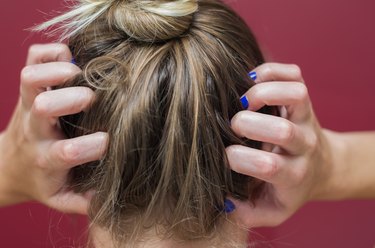
You may have heard claims that diet can help ringworm, and if you have those rough, red patches, you're probably searching for anything that will help. While no foods have been proven to specifically treat ringworm, eating foods to boost your immune system when you have ringworm might help.
First, let's clarify: Ringworm isn't caused by a worm or parasite. According to the Centers for Disease Control and Prevention (CDC), it's actually caused by a fungal infection and is called "ringworm" because the red itchy rash it causes tends to be circular. Other names you'll find for ringworm include "dermatophytosis" or "tinea," depending on the location of infection on the body. For example, tinea pedis is the form of ringworm that most people know as athlete's foot.
Video of the Day
Video of the Day
There's no evidence of vitamin deficiencies being linked to ringworm risk, according to the CDC, but if your immune system is weakened, you may be more likely to get it.
Read more: Foods to Avoid If You Have Tinea Versicolor
Is There a Diet to Treat Ringworm?
"Unfortunately diet alone is not able to treat ringworm," says Kristi King, MPH, RDN, a senior dietitian at Texas Children's Hospital in Houston. "Typically with fungal skin infections such as ringworm, topical medications need to be used to ensure complete eradication of infection."
But your diet may still play a role in your healing. "Eating with the mindset to promote anti-inflammatory responses will help support your immune system while it is fighting off [a ringworm] infection," King says.
To reap anti-inflammatory benefits, she recommends consuming:
- Proteins such as lean meat, eggs and beans.
- Omega-3 sources like nuts, seeds and fatty fish.
- Whole grains such as oatmeal, brown rice and quinoa.
- Vegetables.
- Yogurt.
- Plenty of water.
- Limited caffeine (to avoid dehydration).
For practical advice on how to ensure you get these foods throughout the day, you can look to the DASH (Dietary Approaches to Stop Hypertension) eating plan from the National Heart, Lung, and Blood Institute. Though the diet was originally created to help keep blood pressure in check, an April 2018 review of studies in Clinical Nutrition found DASH decreased inflammatory markers in the blood, which indicates it aids in suppressing inflammatory processes in the body.
Read more: A 7-Day Kickstart Plan to Help Your Immune System
Easy on the Sugar
Though there's no evidence that a low- or zero-sugar diet will prevent ringworm or help get rid of an infection, it may still make sense to watch your sugar intake, King says. "Fungus — just like bacteria — loves sugar, so you want to make sure to eat a diet that is lower in added sugar," she says.
But how do you find where that added sugar hides so you can avoid it? The U.S. Food & Drug Administration has got you covered: It recently updated nutrition label requirements to include an "added sugars'' section under the line that reads "total sugars." For most Americans, the maximum recommended amount of daily added sugars is around 50 grams.
Can Herbs or Supplements Help?
King counsels against trying to fight ringworm with natural remedies like herbs or supplements. "There is no study that supports their use, and if you eat them in large quantities, you may find yourself uncomfortable with gastrointestinal symptoms and bad breath," she says.
King says it's the same with other supplements that are sometimes touted as antifungal treatments for ringworm, such as caprylic acid from coconuts, vitamin B3 and olive leaf extract. "While there may be some laboratory and animal studies on these, I've seen no evidence that they have any real effects in humans with a ringworm infection," she says.
Instead, the CDC recommends non-prescription antifungal creams, lotions or powders, which tend to effectively clear up ringworm within 2 to 4 weeks when applied to the skin. Look for products containing one of these active ingredients:
- Clotrimazole
- Miconazole
- Terbinafine
- Ketoconazole
For ringworm on the scalp, or an infection that doesn't go away with an over-the-counter remedy, you'll need a prescription medication.
- Centers for Disease Control and Prevention: “About Ringworm”
- Centers for Disease Control and Prevention: “Ringworm Risk & Prevention”
- Kristi King, MPH, RDN, LD, CNSC, senior dietitian, Texas Children's Hospital; clinical instructor, Baylor College of Medicine; national spokesperson for the Academy of Nutrition & Dietetics, Houston
- National Heart, Lung, and Blood Institute: “DASH Eating Plan”
- Clinical Nutrition: “The Effect of Dietary Approaches to Stop Hypertension (DASH) on Serum Inflammatory Markers: A Systematic Review and Meta-Analysis of Randomized Trials”
- U.S. Food & Drug Administration: “Added Sugars on the New Nutrition Facts Label”
- Centers for Disease Control and Prevention: “Treatment for Ringworm”
Is this an emergency? If you are experiencing serious medical symptoms, please see the National Library of Medicine’s list of signs you need emergency medical attention or call 911.